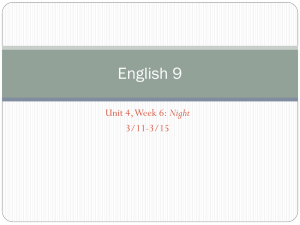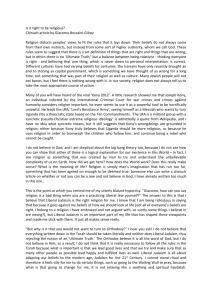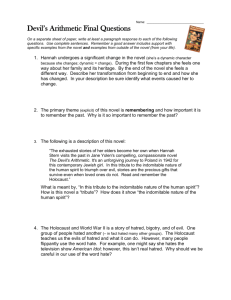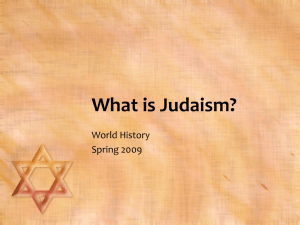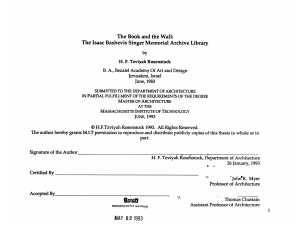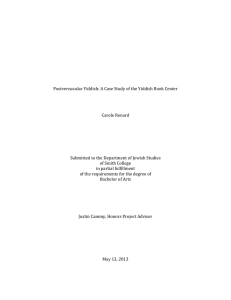Yiddish and the Jewish community - LJY
advertisement
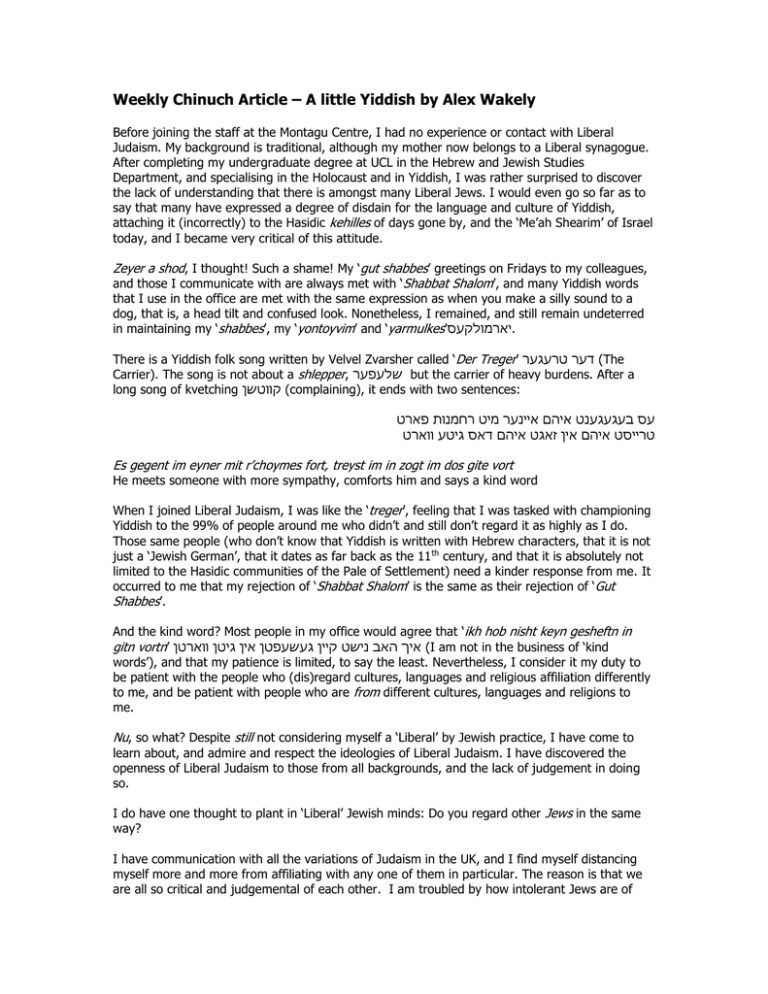
Weekly Chinuch Article – A little Yiddish by Alex Wakely Before joining the staff at the Montagu Centre, I had no experience or contact with Liberal Judaism. My background is traditional, although my mother now belongs to a Liberal synagogue. After completing my undergraduate degree at UCL in the Hebrew and Jewish Studies Department, and specialising in the Holocaust and in Yiddish, I was rather surprised to discover the lack of understanding that there is amongst many Liberal Jews. I would even go so far as to say that many have expressed a degree of disdain for the language and culture of Yiddish, attaching it (incorrectly) to the Hasidic kehilles of days gone by, and the ‘Me’ah Shearim’ of Israel today, and I became very critical of this attitude. Zeyer a shod, I thought! Such a shame! My ‘gut shabbes’ greetings on Fridays to my colleagues, and those I communicate with are always met with ‘ Shabbat Shalom’, and many Yiddish words that I use in the office are met with the same expression as when you make a silly sound to a dog, that is, a head tilt and confused look. Nonetheless, I remained, and still remain undeterred in maintaining my ‘shabbes’, my ‘yontoyvim’ and ‘yarmulkes’יארמולקעס. There is a Yiddish folk song written by Velvel Zvarsher called ‘ Der Treger’ ( דער טרעגערThe Carrier). The song is not about a shlepper, שלעפערbut the carrier of heavy burdens. After a long song of kvetching ( קווטשןcomplaining), it ends with two sentences: עס בעגעגענט איהם איינער מיט רחמנות פארט טרייסט איהם אין זאגט איהם דאס גיטע ווארט Es gegent im eyner mit r’choymes fort, treyst im in zogt im dos gite vort He meets someone with more sympathy, comforts him and says a kind word When I joined Liberal Judaism, I was like the ‘treger’, feeling that I was tasked with championing Yiddish to the 99% of people around me who didn’t and still don’t regard it as highly as I do. Those same people (who don’t know that Yiddish is written with Hebrew characters, that it is not just a ‘Jewish German’, that it dates as far back as the 11th century, and that it is absolutely not limited to the Hasidic communities of the Pale of Settlement) need a kinder response from me. It occurred to me that my rejection of ‘Shabbat Shalom’ is the same as their rejection of ‘ Gut Shabbes’. And the kind word? Most people in my office would agree that ‘ikh hob nisht keyn gesheftn in gitn vortn’ ( איך האב נישט קיין געשעפטן אין גיטן ווארטןI am not in the business of ‘kind words’), and that my patience is limited, to say the least. Nevertheless, I consider it my duty to be patient with the people who (dis)regard cultures, languages and religious affiliation differently to me, and be patient with people who are from different cultures, languages and religions to me. Nu, so what? Despite still not considering myself a ‘Liberal’ by Jewish practice, I have come to learn about, and admire and respect the ideologies of Liberal Judaism. I have discovered the openness of Liberal Judaism to those from all backgrounds, and the lack of judgement in doing so. I do have one thought to plant in ‘Liberal’ Jewish minds: Do you regard other Jews in the same way? I have communication with all the variations of Judaism in the UK, and I find myself distancing myself more and more from affiliating with any one of them in particular. The reason is that we are all so critical and judgemental of each other. I am troubled by how intolerant Jews are of each other, and I have heard this intolerance from Jews in every denomination of Judaism in the UK, Liberals included! I do not want to associate myself with any movement of Judaism that criticises what other Jews do. We each consider ourselves to be like the ‘treger’ in the folk song, believing that we carry the responsibility of our own cause, and overlooking the fact that there are other ‘tregers’ who may have the same concerns, or are rebelling against something for the same reason we are rebelling against something else. I am certainly no innocent. It’s time to be the stranger with the kind word, no? When I go back to the idea that I wish a ‘Gut Shabbes’ in response to a ‘Shabbat Shalom’, I figure that I can be comfortable championing my own cause, whilst still appreciating and respecting the cause of the other. I realise that this enhances my openness to other Jews and non-Jews. Es is mamesh a vunder, ס'איז ממש א ווונדערit is really a wonder, how many cultures, religions and languages there are in the world. The real wonder to me though is adopting the responsibility that no longer makes me the ‘treger’, which is saying the kind word. I will hang on to my Yiddish kishkes ( קישקעסguts) and narishkeit ( נארישקייתnonsense), and let Yiddish continue to grab me by the pupik ( פופיקbelly button) because it is close to my heart. But perhaps, I need to put a little more effort into embracing other people’s interests and philosophies, rather than criticising them for not embracing mine. Perhaps being defensive gets me nowhere. Perhaps the world wakes up speaking Yiddish and living Yiddish culture. What and who would I invest in then? The answer? The ‘treger’. Chinuch articles do not necessarily represent the opinions or views of Liberal Judaism or LJY-Netzer.

